Career Coaching & Career Advice Blog
The articles you need to create
a successful and fulfilling career journey.
The Three Components to Building Professional Reputation

Your professional reputation is in your sphere of control. In this deep-dive article, I will help you understand the three core components of your reputation and provide tips on how you can build, shape, improve and nurture your professional reputation.
What is Professional Reputation
Professional reputation means being held in high esteem. Being well regarded, and respected by the people in a position to know and have an opinion about you. Your professional reputation is all about the equity you’ve built over your academic and professional work years.
A professional reputation is a combination of the skills, knowledge, and experiences that makes you an expert in the subject. It reflects the quality of work you can deliver and how respected you are by your peers and employers. It is also important to remember that your professional reputation is not just based on what you do but also on how you treat others and present yourself.
Building a strong professional reputation takes careful thought, strategic planning, and dedication.
Who Comes to Mind in Your Field?
Think of your field: that is, the profession, spot on the corporate ladder, consulting niche that you operate in, or whatever it is that you get paid to do and that you’re making a name for.
Can you think of someone in your same niche with a gold-star reputation? Who immediately comes to mind when you think of people working in your field?
Why does this person come to mind? It is worth thinking about.
Is the person you thought of at the top of the reputation ladder because of some external, objective index?
Did you put them there based on your interpretation or are you echoing the word on the street?
Is it because this person’s name comes up the most, because they have the biggest following, or because their work is out there and resonates?
It could be any number of factors. The point is, the source of reputation is multi-faceted.
The Benefits of Developing a Professional Reputation
Having a solid professional reputation has many benefits. It can open doors to career advancement, higher-level positions, and increased pay. It can also help you make valuable professional connections, build trust with colleagues, and push projects and initiatives forward.
Developing a professional reputation can also help you stand out from the competition. When employers or buyers of your services are considering multiple candidates for a position, having a good reputation can give you an edge. It can also help you build a strong network of contacts. Finally, having an excellent professional reputation can help you gain respect from your peers and colleagues, which can benefit your personal and professional life.
With an excellent reputation, you increasingly become the go-to person for your work and the solutions you provide, which translates into being in demand.
Another way to look at it is via my sketch below. As you travel on your professional journey, your reputation can be like a tailwind, making the journey more straightforward, and more pleasant and when you have a goal, faster to arrive.
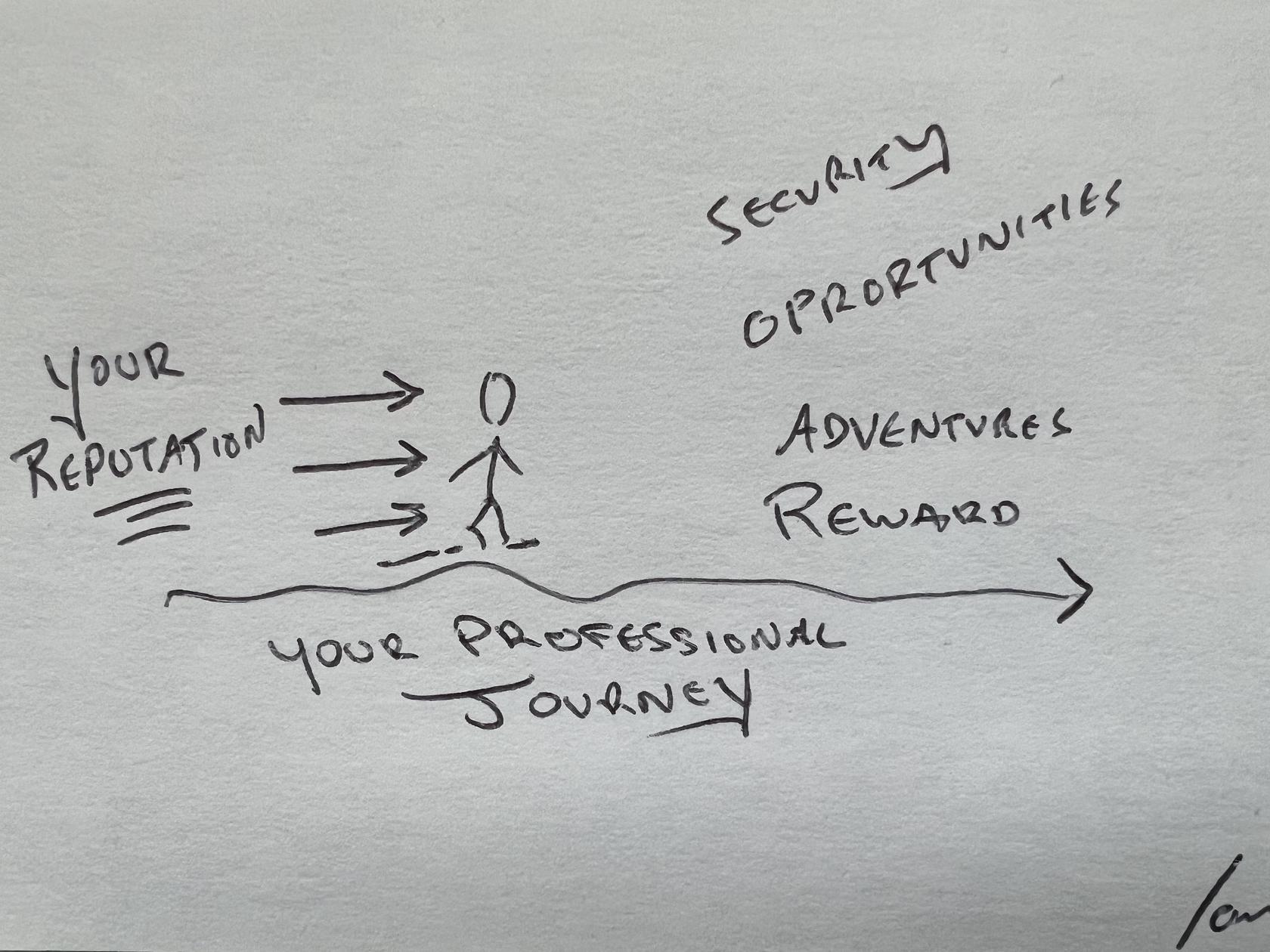
The 3 Components You Need to Build Your Professional Reputation
That gets us into the three components of a professional reputation that works for you, by both protecting you and generating opportunities for you. The components are quality, reach and being referable.
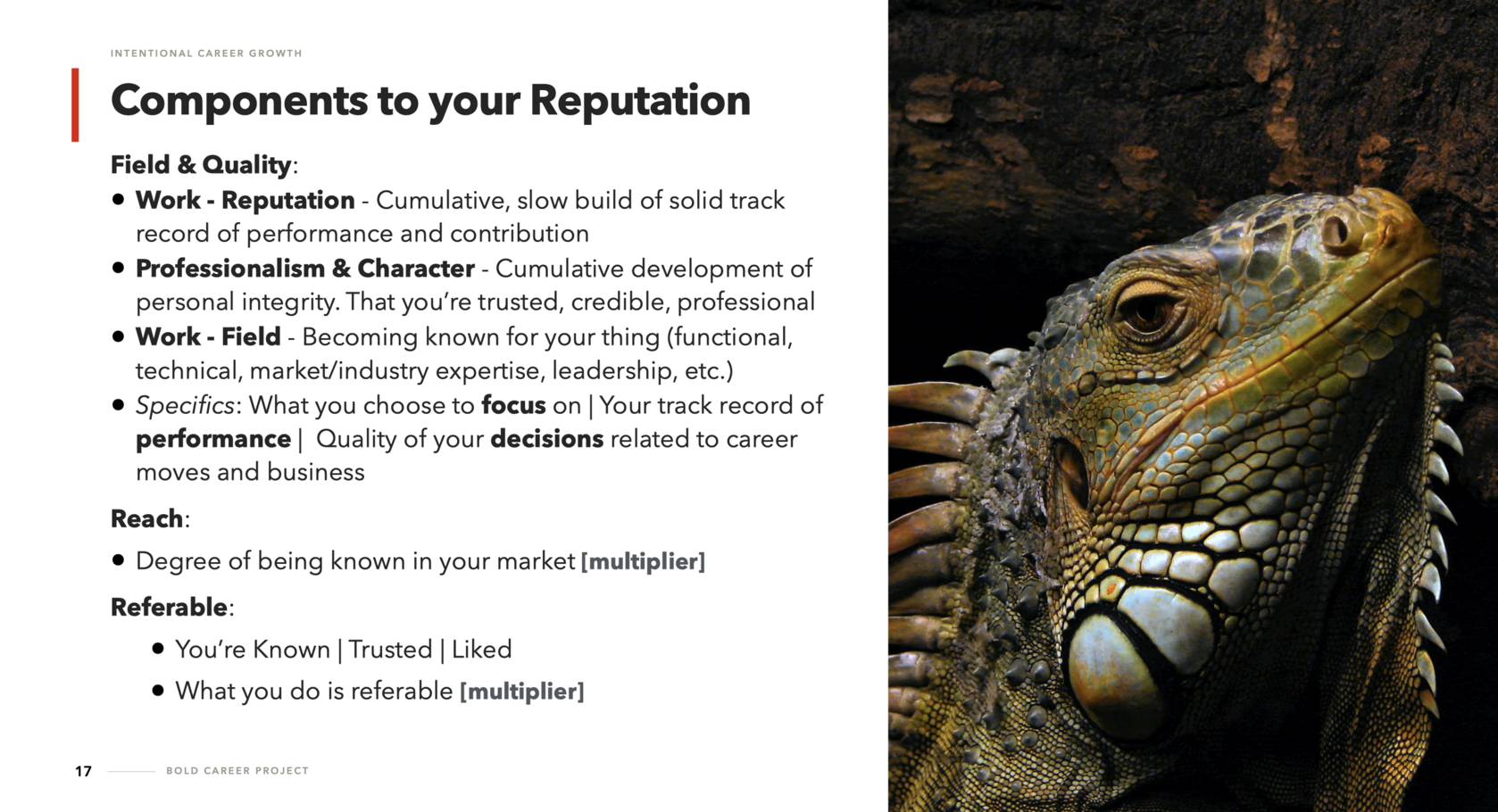
Professional Reputation requires Quality
I see three facets to the quality of your reputation; work quality, professionalism and character, and your professional track record. Let’s examine each in turn.
Work Quality: The perceived quality of your work is measured by some factor of success (profitable, innovative, impactful, etc.). There is a general sense of the quality of your work and more specific measures based on your field of work.
The measurements vary based on fields of work: technical know-how (skill, knowledge), building things (evidenced by excellent products), selling (sales results and happy customers), or running businesses (balance sheets, healthy organization, stock price, exits).
Professionalism & Character: We can probably think of people who are technically strong, or can generate results but lack professionalism or character. Your character and professionalism, as perceived by others, include:
How you’ve treated people
How you’ve conducted “business”
Who and what you’ve associated your career with
Professional Track record: The final element of your work quality is your professional track record. The quality and success of your career decisions, career moves, performance, and your trajectory as evidenced by your CV, LinkedIn profile and word on the street.
There’s an assumption that a path of increasing seniority, high-profile assignments, and prestigious roles enhances professional reputation.
What is your track record? Between similar candidates, the person who can demonstrate a track record of performance and making a difference will have the leg-up.
And in career change situations, a track record of successfully tackling a diverse set of challenges can be an important asset.
In an ideal world, you are strong across all three facets of the quality component of professional reputation.
However, you can be perceived as having an excellent professional reputation without necessarily having all three. Perhaps you can think of someone who epitomizes professionalism and unimpeachable character. They may not be the best technically, or not generate the top results. Still, their consistent focus on professionalism, their solid results and the quality of their relationships has earned them a stellar reputation.
If the first element of a solid professional reputation is quality, the second is reach.
Don’t be Your Boss’ Best-Kept Secret | Increase Your Reach
I’ve worked with many fine professionals over the years who had the quality part of their reputation nailed down. Alas, only a few local colleagues knew about them.
If the only people who know about your good work are in the same office, you’re missing a key part of a vibrant professional reputation. And more specifically, you are putting your success and fulfillment at risk.
Professional reach: The degree to which you are known across your organization (internal) and in your market and industry ecosystem (external).
When asked, your name comes to mind. By the right people. People who are in a position to do something about it (hire, buy, refer).
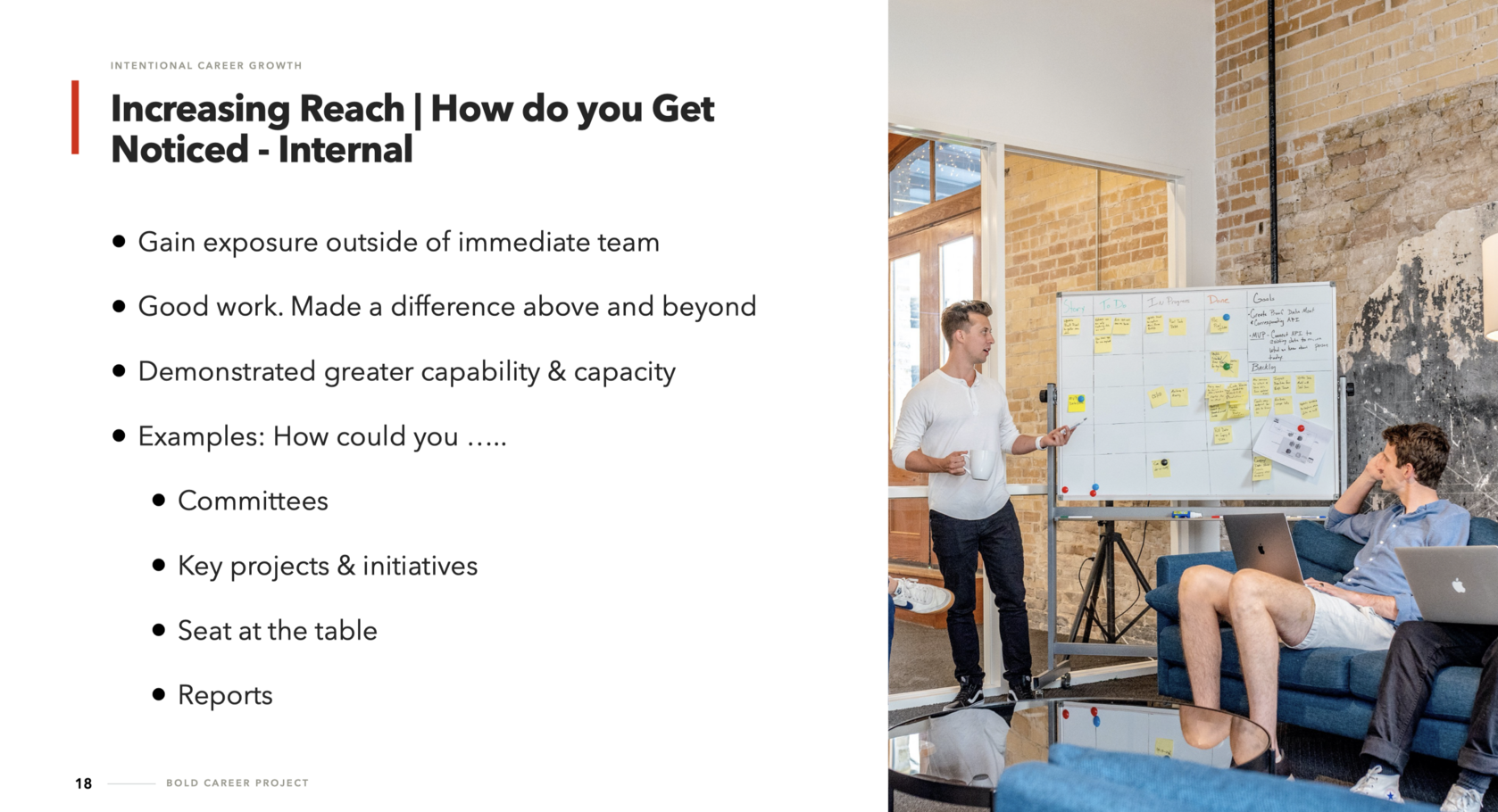
Now, it’s true that some people have an advantage here in that their work involves them interacting externally - with customers, vendors, partners, professional service firms, at conferences, etc.
There are ways to combat this of course. Through intentional development of a network. By building an audience. Through charitable work. By ensuring you play a role at conferences.
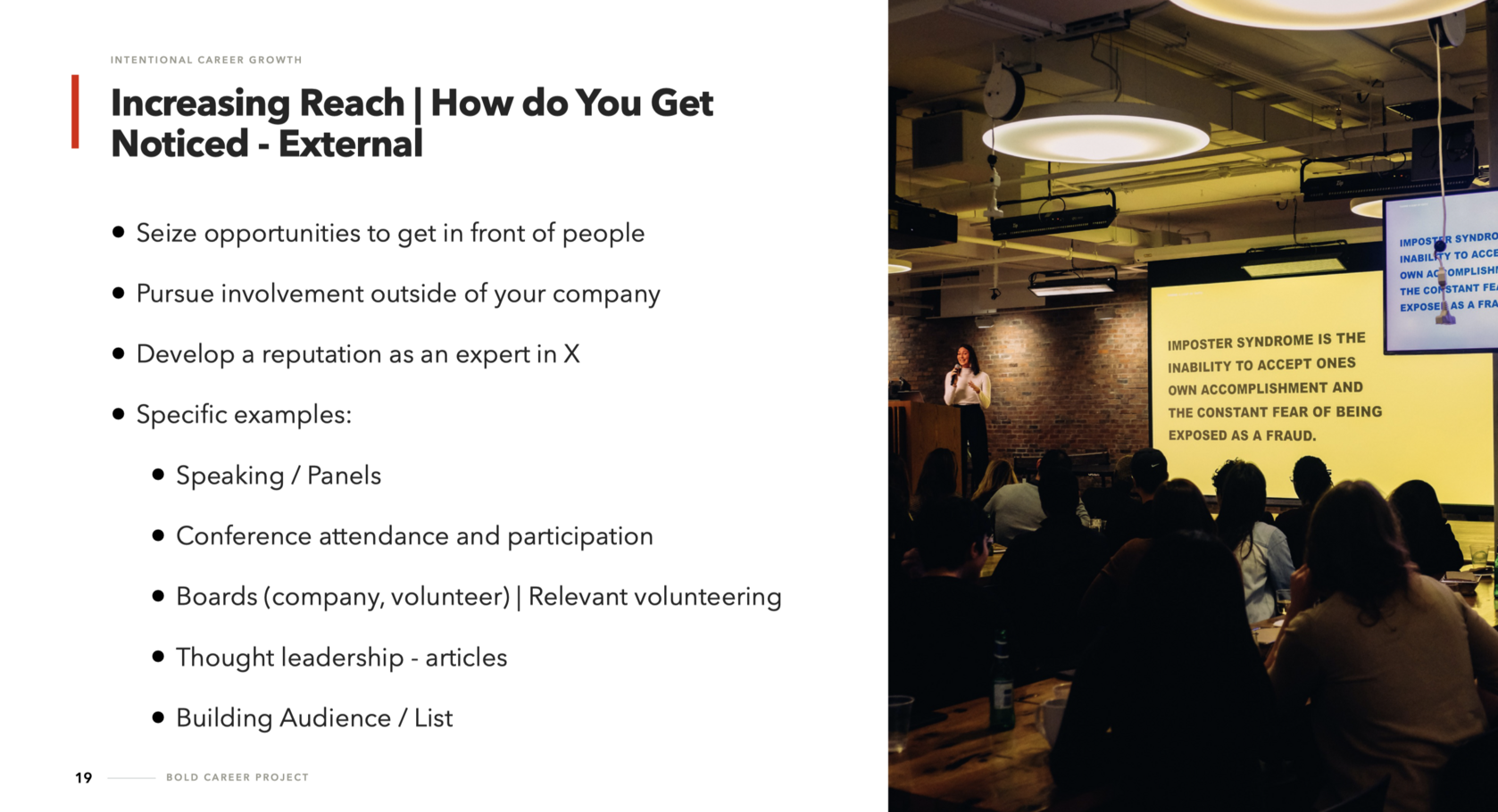
If you are someone who isn’t entirely comfortable with the idea of networking, reach is the main reason we want to build more and higher quality professional relationships.
Networking with people who are influential in your industry can open up doors for career opportunities and valuable contacts. Additionally, building relationships with people in your field can help you stay informed about industry news, trends, and developments. You can also benefit from mentoring relationships, where experienced professionals share their expertise with you.
It is important to remember that professional connections are not just about what you can get out of them. It is also important to be generous with your time and knowledge and to be willing to help others in your network. This can help you build strong relationships and create a positive reputation in your industry.
The third component of a strong professional reputation is being referable.
Professional Reputation Requires being Referable
What causes someone to refer you to another individual or for an opportunity?
First, there’s knowledge about you. As defined by reach. Both what you do and your goals.
Second, there’s trust involved. The referring person needs to know that their referral will not bite them.
Third, there needs to be some liking, and a desire to help out at least one of the parties involved.
And fourth, there’s the degree to which your work is referable. The meme has to have some energy to be highly referable. Some people’s niches are more shareable than others.
photographers
physios
accountants
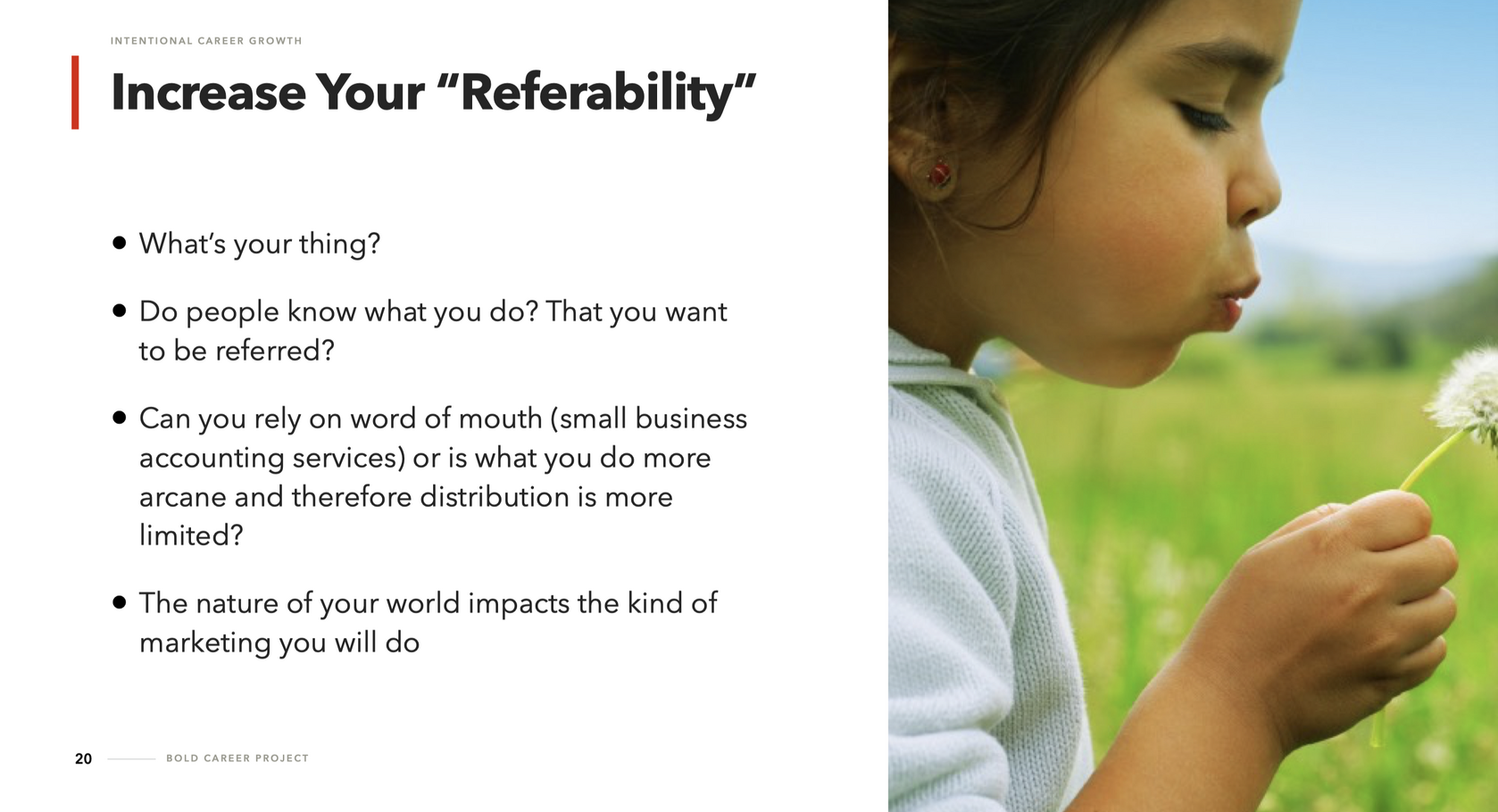
Do not despair if you don’t fit into one of these common referring categories.
Develop your Messaging: What do you want to be known as? What k
Make sure that is clear on your LinkedIn profile.
Showcase Your Skills and Expertise: Besides the basics, it is important to find ways to showcase your skills and expertise. This can be done in a variety of ways including
volunteering,
giving speeches or presentations at industry events,
writing articles or blog posts,
joining relevant industry organizations,
attending networking events and conferences,
and collaborating with others on projects.
You can also use social media to your advantage by creating a professional profile and sharing relevant content. Additionally, you can use online tools such as LinkedIn to connect with other professionals in your field and build your network.
By showcasing your skills and expertise, you can demonstrate your value to potential employers and increase your chances of success.
(Which circles back to being strategic about getting to know the influencers in your space.)
Obstacles to Building Professional Reputation
Despite best intentions and efforts, there may be obstacles to developing a solid professional reputation. These obstacles may include
limited resources or knowledge in certain areas,
difficulty networking in certain industries or locations,
difficulty staying abreast of industry trends due to limited access to materials or events,
potential for bias or discrimination in the workplace. This can be especially true for those who are members of minority groups or who are new to the industry.
Or perhaps you’ve had a stumble on your professional journey and need to repair your reputation.
Be aware of these potential obstacles and take steps to ensure that they do not impede progress in building a professional reputation. It is important to remember that overcoming these obstacles takes dedicated effort and commitment. The key is paying attention to your intention.
9 Benefits of Reputation Management
While we have different motivators and are at different stages of our careers, I argue that we all need to engage in reputation management. You can develop a decent professional reputation somewhat accidentally. But it does take some work to make your reputation a cornerstone of your professional offering.
And that’s where the benefits accrue. Here’s a sample of what you can experience from developing and nurturing your professional :
Being top of mind as a go-to person. respected and liked
Receiving invitations to write / speak / represent, which solidifies your reputation
Winning access to people and conversations that can dramatically shift your circumstances, create higher-level learning opportunities,
Experiencing easier job transitions when you need or want to move
Generating a flow of professional opportunities over the long haul
Increased earning power
Mitigating risk so you are better insulated from layoffs and economic downturns.
Having equity built up so you will be fine when those inevitable stumbles occur.
Experiencing better personal relationships and mental health as a result of a thriving professional journey!
What I want for you is greater control over your professional journey so that you can experience all of the above.
Building a strong professional reputation requires dedication and effort but can be an invaluable asset when it comes to career success. By carefully crafting an image of yourself as an expert in your field, making valuable connections within your industry, showcasing your skills and expertise, leveraging your achievements, and avoiding behaviours that can damage your reputation, you can create a positive image that will open doors for career advancement.
Focus first on quality, as defined by the success and impact measurements in your profession, your professionalism and character, and your track record.
Second, don’t rely on merit alone. Focus on reach and be strategic about getting in front of the right people in your domain.
Third, focus on enhancing your refer-ability by building trust and liking and ensuring people know precisely what you do and who you do it for.
It is important to remember that your professional reputation is something that you must actively maintain. Staying up to date with industry trends, networking with peers, and engaging in professional development activities are all important steps to take to maintain a positive reputation.
While a vibrant professional reputation is a long game, it’s within your reach.
Feeling stuck? Consider working with one of our professional career coaches. We can help you build your professional reputation and unlock your career potential. Contact us to get the conversation started.
